-
 Bitcoin
Bitcoin $90,752.5471
4.27% -
 Ethereum
Ethereum $1,688.3053
6.41% -
 Tether USDt
Tether USDt $1.0006
0.08% -
 XRP
XRP $2.1453
3.23% -
 BNB
BNB $607.1447
1.71% -
 Solana
Solana $144.2444
7.14% -
 USDC
USDC $0.9997
-0.01% -
 Dogecoin
Dogecoin $0.1703
8.31% -
 TRON
TRON $0.2467
1.46% -
 Cardano
Cardano $0.6557
5.58% -
 Chainlink
Chainlink $13.7511
5.08% -
 Avalanche
Avalanche $21.5976
7.79% -
 UNUS SED LEO
UNUS SED LEO $8.9863
-1.47% -
 Stellar
Stellar $0.2566
1.55% -
 Sui
Sui $2.3975
10.43% -
 Shiba Inu
Shiba Inu $0.0...01300
5.63% -
 Toncoin
Toncoin $2.9806
2.64% -
 Hedera
Hedera $0.1760
4.31% -
 Bitcoin Cash
Bitcoin Cash $355.4488
3.40% -
 Litecoin
Litecoin $82.9174
5.86% -
 Hyperliquid
Hyperliquid $18.6132
6.14% -
 Polkadot
Polkadot $3.8737
1.18% -
 Dai
Dai $0.9998
0.01% -
 Bitget Token
Bitget Token $4.5191
1.97% -
 Ethena USDe
Ethena USDe $0.9996
0.04% -
 Pi
Pi $0.6386
1.01% -
 Monero
Monero $220.4697
3.17% -
 Pepe
Pepe $0.0...08356
7.90% -
 Uniswap
Uniswap $5.5839
5.52% -
 Aptos
Aptos $5.0800
1.52%
How to verify the authenticity of the URL of the trading platform and wallet?
When verifying trading platform and wallet URL authenticity, carefully examine the URL structure for misspellings, check the certificate and look for security measures like HTTPS and 2FA.
Jan 10, 2025 at 06:30 am

Key Points
- Importance of verifying URL authenticity
- Techniques for identifying phishing URLs
- Steps to ensure wallet URL genuineness
- Common phishing tactics to watch out for
- Alerting authorities and reporting suspicious activity
How to Verify the Authenticity of the URL of the Trading Platform and Wallet?
1. Carefully Examine the URL Structure:
- Inspect the URL for any misspellings or unusual characters. Phishers often use similar domain names to legitimate platforms, so pay close attention to the details.
- Check the website's certificate by clicking on the padlock icon in the browser's address bar. The certificate should be issued by a reputable authority and should match the website's domain name.
- Look for additional security measures such as HTTPS (denoted by a padlock icon) or two-factor authentication (2FA). Reliable websites typically implement these measures to protect user data.
2. Verify the Platform's IP Address:
- Use a website checker or command-line tools such as "ping" or "whois" to obtain the IP address of the website.
- Compare this IP address with the IP address associated with the legitimate website. If they do not match, the website may be illegitimate.
- Note that phishers may use advanced techniques to disguise the true IP address, so this method may not always be reliable.
3. Check the Website's History:
- Use web archives or internet search engines to find archived versions of the website.
- Compare the archived versions with the current website to identify any discrepancies in design, content, or functionality.
- Be suspicious of websites that have been created recently or have undergone significant changes.
4. Look for Red Flags:
- Phishing websites often contain grammatical errors, poor-quality design, and inconsistent branding.
- Be cautious of websites that pressure you to act quickly or provide sensitive information.
- Legitimate platforms typically have a clear and well-established brand reputation and avoid using overly aggressive language.
5. Use Security Tools:
- Install browser extensions or anti-phishing software to detect and block suspicious websites.
- Use password managers to generate strong passwords and avoid reusing them across different accounts.
- Enable two-factor authentication (2FA) for your trading accounts and wallets to add an extra layer of security.
6. Trust Only Official Sources:
- Always access trading platforms and wallets through their official websites or verified mobile applications.
- Avoid clicking on links from unknown or suspicious sources.
- If in doubt, contact the platform's support team directly to verify the authenticity of a URL.
7. Report Suspicious Activity:
- If you believe you have encountered a phishing website or URL, promptly report it to the relevant authorities. This helps prevent others from falling victim to similar scams.
- You can also report phishing websites to organizations such as PhishLabs, Anti-Phishing Working Group (APWG), or the Internet Crime Complaint Center (IC3).
Frequently Asked Questions (FAQs)
Q: How can I protect myself from phishing scams?
A: Follow the steps outlined in this article to verify URL authenticity, use security tools, trust only official sources, and report suspicious activity.
Q: What is smishing?
A: Smishing is a type of phishing scam where fraudsters send text messages to trick victims into providing sensitive information or clicking on malicious links.
Q: What are the latest phishing trends?
A: Phishing tactics are constantly evolving. Common recent trends include using deep fakes, creating lookalike websites, exploiting social engineering, and targeting mobile users.
Q: What should I do if I have fallen victim to a phishing scam?
A: Immediately change any compromised passwords, contact your bank or financial institution to report fraudulent activity, and report the incident to the relevant authorities.
Disclaimer:info@kdj.com
The information provided is not trading advice. kdj.com does not assume any responsibility for any investments made based on the information provided in this article. Cryptocurrencies are highly volatile and it is highly recommended that you invest with caution after thorough research!
If you believe that the content used on this website infringes your copyright, please contact us immediately (info@kdj.com) and we will delete it promptly.
- Bitcoin (BTC) Price Surges to Two-Week High, Breaking Above $90,000
- 2025-04-23 01:00:12
- Popcat (POP) Price Soars Over 20% As Investors Rush To Buy The Meme Coin
- 2025-04-23 01:00:12
- Bitcoin (BTC) hits six-week highs as US trade war tensions embolden crypto bulls
- 2025-04-23 00:55:12
- An Encouraging Situation for Polygon
- 2025-04-23 00:55:12
- The European Central Bank (ECB) is the alarm about President Trump's policy
- 2025-04-23 00:50:12
- SUBBD Token Aims to Disrupt the $85000000000 Content Creation Market by Targeting OnlyFans
- 2025-04-23 00:50:12
Related knowledge

What role does SEC play in Bitcoin ETF approval?
Feb 25,2025 at 06:48am
Key Points:SEC's Role in Bitcoin ETF Approval ProcessHistorical Efforts to Establish a Bitcoin ETFSEC's Criteria for Bitcoin ETF ApprovalPotential Impact of a Bitcoin ETF on the Cryptocurrency MarketTimeline and Outlook for Bitcoin ETF ApprovalArticle:SEC Play in Bitcoin ETF ApprovalThe United States Securities and Exchange Commission (SEC) plays a crit...

Who is eligible to issue Bitcoin ETFs?
Feb 25,2025 at 11:13am
Key Points:Only regulated financial institutions with the necessary expertise and infrastructure are eligible to issue Bitcoin ETFs.The Securities and Exchange Commission (SEC) has not yet approved any spot Bitcoin ETFs, but has approved several futures-based ETFs.Applicants must meet stringent requirements, including having a strong track record and su...

What impact does Bitcoin ETF have on the market?
Feb 25,2025 at 11:37am
Key Points:Introduction to Bitcoin ETFs and their role in the cryptocurrency marketHistorical development and performance of Bitcoin ETFsPotential benefits of Bitcoin ETFs for investors and the marketRisks and limitations associated with Bitcoin ETFsRegulatory considerations and their impact on Bitcoin ETFsArticle:Introduction to Bitcoin ETFsBitcoin exc...

Which investors are Bitcoin ETFs suitable for?
Feb 27,2025 at 04:01pm
Key Points:Understanding Bitcoin ETFsBenefits of Bitcoin ETFsSuitability of Bitcoin ETFs for Different InvestorsAssessing Risk Tolerance and Investment GoalsConsidering Short-Term and Long-Term StrategiesExamining Tax ImplicationsSeeking Professional AdviceUnderstanding Bitcoin ETFsBitcoin exchange-traded funds (ETFs) are investment vehicles that track ...

What is the administrative expenses of Bitcoin ETFs?
Feb 26,2025 at 12:24am
Key Points:Administrative expenses are a crucial factor to consider when evaluating Bitcoin ETFs.These expenses can significantly impact the performance of the fund and ultimately the investor's returns.Understanding the various components of administrative expenses is essential for informed decision-making.Comparing administrative expenses across diffe...

What are the fees for purchasing Bitcoin ETFs?
Feb 27,2025 at 07:13pm
Key Points:Bitcoin exchange-traded funds (ETFs) are a cost-effective and regulated way to gain exposure to Bitcoin.Fees associated with Bitcoin ETF purchases vary depending on the platform, trading volume, and account type.It is essential to evaluate fee structures carefully to optimize investment returns.Fees Associated with Purchasing Bitcoin ETFs1. B...

What role does SEC play in Bitcoin ETF approval?
Feb 25,2025 at 06:48am
Key Points:SEC's Role in Bitcoin ETF Approval ProcessHistorical Efforts to Establish a Bitcoin ETFSEC's Criteria for Bitcoin ETF ApprovalPotential Impact of a Bitcoin ETF on the Cryptocurrency MarketTimeline and Outlook for Bitcoin ETF ApprovalArticle:SEC Play in Bitcoin ETF ApprovalThe United States Securities and Exchange Commission (SEC) plays a crit...

Who is eligible to issue Bitcoin ETFs?
Feb 25,2025 at 11:13am
Key Points:Only regulated financial institutions with the necessary expertise and infrastructure are eligible to issue Bitcoin ETFs.The Securities and Exchange Commission (SEC) has not yet approved any spot Bitcoin ETFs, but has approved several futures-based ETFs.Applicants must meet stringent requirements, including having a strong track record and su...

What impact does Bitcoin ETF have on the market?
Feb 25,2025 at 11:37am
Key Points:Introduction to Bitcoin ETFs and their role in the cryptocurrency marketHistorical development and performance of Bitcoin ETFsPotential benefits of Bitcoin ETFs for investors and the marketRisks and limitations associated with Bitcoin ETFsRegulatory considerations and their impact on Bitcoin ETFsArticle:Introduction to Bitcoin ETFsBitcoin exc...

Which investors are Bitcoin ETFs suitable for?
Feb 27,2025 at 04:01pm
Key Points:Understanding Bitcoin ETFsBenefits of Bitcoin ETFsSuitability of Bitcoin ETFs for Different InvestorsAssessing Risk Tolerance and Investment GoalsConsidering Short-Term and Long-Term StrategiesExamining Tax ImplicationsSeeking Professional AdviceUnderstanding Bitcoin ETFsBitcoin exchange-traded funds (ETFs) are investment vehicles that track ...

What is the administrative expenses of Bitcoin ETFs?
Feb 26,2025 at 12:24am
Key Points:Administrative expenses are a crucial factor to consider when evaluating Bitcoin ETFs.These expenses can significantly impact the performance of the fund and ultimately the investor's returns.Understanding the various components of administrative expenses is essential for informed decision-making.Comparing administrative expenses across diffe...

What are the fees for purchasing Bitcoin ETFs?
Feb 27,2025 at 07:13pm
Key Points:Bitcoin exchange-traded funds (ETFs) are a cost-effective and regulated way to gain exposure to Bitcoin.Fees associated with Bitcoin ETF purchases vary depending on the platform, trading volume, and account type.It is essential to evaluate fee structures carefully to optimize investment returns.Fees Associated with Purchasing Bitcoin ETFs1. B...
See all articles























































































